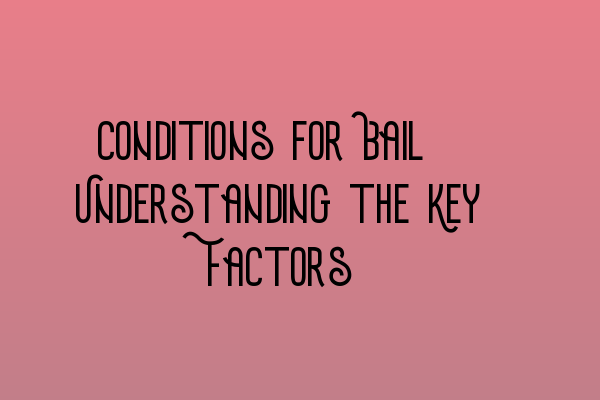Conditions for Bail: Understanding the Key Factors
When it comes to criminal cases, the concept of bail is one that many people are familiar with. Bail allows a person to be released from custody while they await their trial. However, obtaining bail is not a given right and is subject to certain conditions. In this article, we will explore the key factors that determine whether or not bail can be granted, and the conditions that may be imposed.
Presumption in Favor of Bail
In the criminal justice system, there is a presumption in favor of granting bail. This means that the court will generally consider releasing the accused unless there are compelling reasons not to do so. The primary goal is to ensure that the defendant shows up for their trial and does not pose a risk to public safety.
Factors Considered by the Court
When deciding whether to grant bail, the court takes into account various factors. These factors include:
- The seriousness of the offense: The more serious the offense, the less likely bail will be granted. This is because there is a higher likelihood that the accused may try to flee or pose a danger to the community.
- The defendant’s criminal history: A person with a history of previous convictions or failures to appear in court is less likely to be granted bail.
- The defendant’s ties to the community: If the defendant has strong ties to the community, such as a stable job, family, or property ownership, it may increase the likelihood of bail being granted.
- The defendant’s flight risk: The court will assess the likelihood of the defendant fleeing to avoid facing the charges against them.
- The risk to public safety: The court will consider whether the defendant poses a risk to public safety if released on bail. This factor is particularly important in cases involving violent crimes.
Conditions that may be Imposed
Even if bail is granted, the court may impose certain conditions to ensure the defendant’s compliance with the law. Some common conditions include:
- Reporting to a designated police station on a regular basis
- Obeying a curfew and remaining at home during specific hours
- Handing over travel documents, such as passports
- Refraining from contacting certain individuals, including victims or witnesses
- Not engaging in illegal activities or drug/alcohol use
By imposing these conditions, the court aims to balance the defendant’s right to freedom with the need to ensure their appearance in court and protect public safety.
It’s important to note that failure to comply with bail conditions can result in the revocation of bail and the defendant being returned to custody.
Conclusion
Obtaining bail in criminal cases is subject to various factors and conditions. The court carefully considers the seriousness of the offense, the defendant’s criminal history, their ties to the community, flight risk, and the potential risk to public safety. If bail is granted, the court may impose conditions to ensure compliance. Understanding these key factors is crucial for anyone involved in the criminal justice system.
Related Articles:
For more information on the SQE exams and preparation, check out these related articles:
- SQE 1 Practice Exam Questions
- SQE 1 Practice Mocks FLK1 FLK2
- SQE 2 Preparation Courses
- SQE 1 Preparation Courses
- SRA SQE Exam Dates
